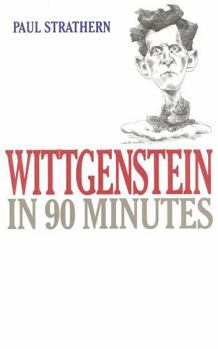Wittgenstein in 90 Minutes
(Part of the Philosophers in 90 Minutes (#27) Series and Virgin Philosophers Series)
Select Format
Select Condition 
Book Overview
"Each of these little books is witty and dramatic and creates a sense of time, place, and character....I cannot think of a better way to introduce oneself and one's friends to Western civilization."--Katherine A. Powers, Boston Globe. "Well-written, clear and informed, they have a breezy wit about them....I find them hard to stop reading."--Richard Bernstein, New York Times. "Witty, illuminating, and blessedly concise."--Jim Holt, Wall Street Journal...
Format:Paperback
Language:English
ISBN:1566631319
ISBN13:9781566631310
Release Date:September 1996
Publisher:Ivan R. Dee Publisher
Length:89 Pages
Weight:2.55 lbs.
Dimensions:0.3" x 5.2" x 8.0"
Customer Reviews
3 ratings
Philosophy is letting the fly out of the fly bottle -twice
Published by Thriftbooks.com User , 19 years ago
This narrative of Wittgenstein's life brilliantly illuminates his character and his philosophy. Wittgenstein as a character fascinates. His principled approach to reality, his mad determination to fight to the end to know the ' truth'are at the heart of the story. The son of one of the wealthiest families in Austria of the thirties his overpowering and dominant father apparently paralyzed Wittgenstein's three brothers and did a good job of helping make him one of the strangest great philosophers of all. Wittgenstein is according to Strathern the only one of the great philosophers aside from Leibniz who had two different total answers to the questions of philosophy. One of the faults of the book is that Strathern does not do justice to the second philosophy that of ' The Philosophical Investigations' which he understands to be a nitpicking kind of wordplaying. And this when he does an excellent job of explaining Wittgenstein's first work ' The Tractatus'. I found one of the most interesting parts of the work to be the story of Wittgenstein's relationship with Russell. How Russell who had attempted to in the ' Principia ' with Whitehead found all Mathematics on the basis of Logic was first corresponded with, then visited, then somehow forced into endless philosophical dialogue with Wittgenstein. Wittgenstein would not leave Russell or the truth alone, and as far as Strathern could discern succeeded eventually in finishing off Russell as a philosopher as he went beyond him. Wittgenstein was a soldier in the first world war and a heroic one. The 'Tractatus' in which he thought he had answered all the problems of philosophy was completed when he was in a prisoner- of -war camp. 'The world is everything that is the case' he begins. And in a series of aphoristic staccato declarations he believes himself to polish off the whole of the Western philosophical tradition. He then retires from philosophy and goes off to be a village schoolteacher where his highly principled approach turns out to be absolutely inappropriate to the simple village children he teaches. He returns to philosophy when he understands that he has not really solved it all. He even reluctantly goes back to Cambridge where he teaches for fifteen years in the style which so entranced many of his devotees. The little room , the long silences, the pained expression, the waiting, and then the eruption of the ' thought'. Strathern says that the only who ever dared to contradict him in these sessions was another brilliant suicidal mind , Turing. In any case out of these probings came the 'Philosophical Investigations ' with its obsession with ordinary language. By the way a bit ironically one of the concepts Wittgenstein developed in that work is that of - family resemblance- which has to do with defining the essence of a concept and understanding that it does not have a simple single essence ordinarily but ' overlapping characteristics ' with a ' family of other concepts' as if were a series
Entertaining Introduction
Published by Thriftbooks.com User , 23 years ago
Strathern has a real gift for "putting the cookies on the lowest shelf." Unfortunately, with a thinker of the complexity of Wittgenstein, that can often lead to shallowness. This book suffers more from its narrowness of scope, though. While its biographical aspects are complete, its description of Wittgenstein's philosophy focuses almost entirely on the Tractatus, only mentioning briefly his later developments of linguistic theory, which more than anything else he produced has influenced postmodernism. In fact, I don't recall ever seeing the term "language game" used in the book! Nevertheless, because the book requires such a minimal investment of time, it is probably a good place to start. Just don't end there.
Strathern hits his mark
Published by Thriftbooks.com User , 24 years ago
Strathern is a master at this kind of work, which mixes biography, critical analysis, historical context and humor all in a concise, informative & entertaining package. He lists a time line for the philosopher, his place in world/philosophic history & a selection of works for furthur reading. This series of books by Strathern is a wonderful course in Philosophy 101 without ever having to go to college, all presented in plain, easy to understand English without being bogged down with philosophy's often confusing vernacular. If you are expecting an in-depth review or complete analysis of the philosopher's life & work, read another book. This is meant to be a quick, concise overview & that's just what it provides.





